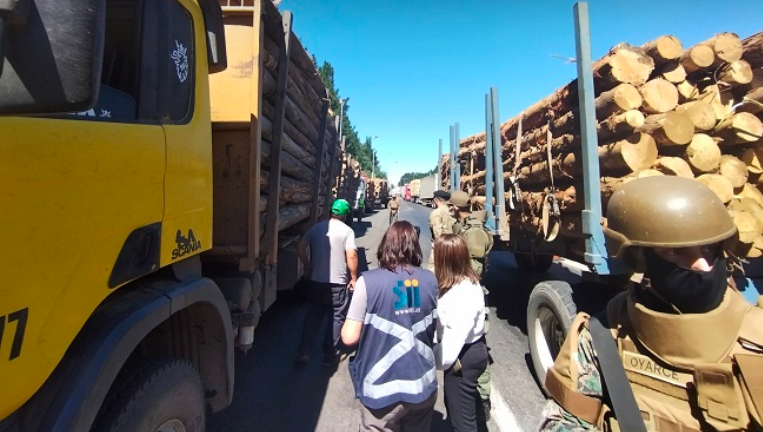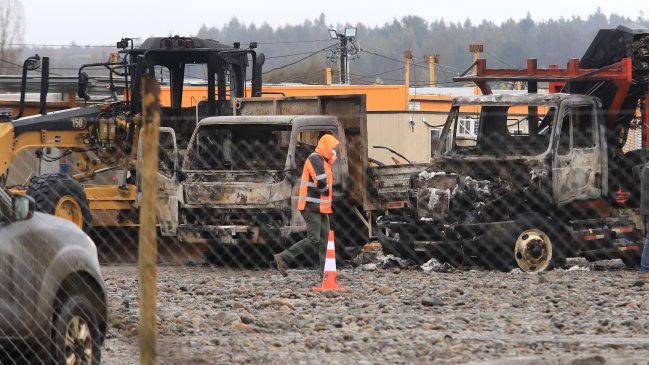As a forestry association committed to clarifying the facts and ensuring political dedication to its investigation and prosecution, we consider it important to share the main conclusions reached:
Timber theft is both a product and a symptom of the security crisis affecting the Southern Macrozone, which has now spread to the rest of the country. Non-compliance with laws, negligence in criminal prosecution by responsible agencies, widespread impunity, among other factors, have cast a shadow over the region and the nation, challenging the democratic system and the freedom of citizens.
Thus, the criminal phenomenon of timber theft has evolved into a multi-million-dollar industry that, due to the lack of decisive penal or administrative prosecution, has gained (and will continue to gain) vast territories for criminal groups. These paramilitary gangs impose their rule while accumulating money and weapons, engaging in activities outside the law, governed solely by those with greater firepower and audacity—to the point where ideological justifications or territorial claims are no longer arguments used by these criminal structures.
Being an extremely profitable and low-risk criminal market due to the constant absence of the State, it has not only become a broad and contested criminal space but also a model replicated nationwide (e.g., mining products in the north and north-central regions, food in the central zone, marine products in the south and far south, etc.).
Like any profitable criminal opportunity, new actors (not necessarily local and even more complex) may join, bringing with them new practices to strengthen the criminal mechanism and industry. Corruption threats, intimidation of victims and witnesses, forced displacements, institutional and political infiltration will become common components.
Finally, the State demonstrates weak capacity to address timber theft, a complex mechanism involving multiple stages. Control must extend beyond crime prevention or on-the-spot prosecution. Case investigations should enable police, the Public Prosecutor's Office, the judiciary, and the State to understand the criminal model and their respective roles in combating it, requiring specialization.
Based on testimonies gathered by the Commission, there is no evidence, under any circumstances, linking the Mapuche cause or Indigenous territorial demands to the criminal organizations enabling the development and trade of organized crime related to timber theft.
Conclusions and Recommendations
I.- Regarding the Role of Police Forces
1) For more effective work, teams dedicated to investigating timber theft should be reinforced with professionals such as forestry engineers, accountants, tax experts, geographers, etc.
Consequently, the State should allocate a budget to these institutions commensurate with the demands placed on them to investigate such crimes.
2) In the case of the PDI (Investigative Police), it is recommended to provide resources that strengthen police work, such as autonomous and immediate air transport for interdisciplinary teams to required areas, with reduced response times compared to the current situation, enabling the deployment of specialized police units.
3) For Carabineros (National Police), they must have intelligence information, equipment, and technology to track the schedules and routes of stolen material transport, as well as the origin and destination of shipments.
Additionally, the institution should implement a rotation system for officers stationed too long in a specific territory, as prolonged stays may facilitate corruption practices among Carabineros members, aside from potential coercion or threats they may face.
II.- The Public Prosecutor's Office
1) Investigations should not only focus on criminal prosecution but also, given the complexity of the phenomenon, on understanding the model used by criminal organizations involved in this illicit activity.
2) Over 20 years have passed since the Criminal Procedure Reform, making it prudent to evaluate how this institution has functioned, especially considering the current insecurity in the country, particularly in the Southern Macrozone, with increasingly organized and complex crime.
Given this context, the Commission concluded that more prosecutors—specialized ones—are needed for areas affected by timber theft.
This requires amending the Organic Law of the Public Prosecutor's Office solely to increase the number of prosecutors, while hiring specialized support staff or professionals to aid investigations from a technical perspective only demands additional funding.
3) Another key aspect involves reviewing the distribution of personnel within the Public Prosecutor's Office, as decentralization is not functioning effectively in this institution.
4) Lastly, it is suggested that the Public Prosecutor's Office implement an internal control and rotation system for prosecutors after cases conclude, as prolonged assignments may facilitate corruption practices among its members, aside from potential coercion or threats.
III.- Logistical and Technological Support for Better Oversight
1) Agencies (Prosecutor's Offices, Police, SII, Customs, CONAF) must be equipped with technology enabling adequate field oversight and data cross-referencing among themselves and with industry companies to establish "good timber seals," improving and standardizing timber traceability.
Such equipment includes cameras, drones, software, etc.
2) Both SII and CONAF require specialized and dedicated teams to inspect clandestine sawmills and illegal logging using technological tools (e.g., georeferencing), as seen with 32 unregulated sawmills located between Cañete and Los Sauces within a 90-kilometer radius, never inspected.
CONAF's management plans should specify timber volume rather than hectares and improve coordination with SII to verify if extracted timber volumes match issued invoices.
3) SII and Customs must implement an oversight plan targeting money laundering and pursuing the so-called "money trail."
This plan requires coordination with police forces, as inspectors without prosecutorial roles (e.g., SII, Customs) cannot confront organized crime gangs that may threaten their lives or safety. Ultimately, police must provide protection so these institutions can fulfill their oversight duties.
IV.- Legislative Framework
A stronger legal framework is needed, aligned with the effective law penalizing timber theft. However, this increases the likelihood of organized crime gangs shifting to other lucrative activities (e.g., livestock or vehicle theft). Thus, advancing pending bills—such as those on intelligence, critical infrastructure, and land usurpation—is essential, as timber theft often begins with illegal land occupation.
V.- Other Recommendations
1) Strengthen counterintelligence and probity, given organized crime's efforts to corrupt public institutions. Hence, monitoring police and agencies like SII and CONAF is necessary.
Given the scale of illicit operations, corruption may already exist in some public institutions, requiring the State to remain vigilant against potential cases linked to such illegal activities.
2) Attention must extend beyond timber theft to illegal logging of native forests, especially on large state-owned lands in Los Ríos and Los Lagos regions, closely tied to illegal firewood production. The Ministry of National Assets should take a more active oversight role.
To support this, CONAF should periodically assess native forest quality using advanced satellite technology, avoiding the need for field personnel.
3) Lastly, a legal amendment is recommended to allow the General Directorate of Pawn Credit to quickly sell or auction seized trucks and machinery, with proceeds allocated to agencies combating organized timber theft.
As Acoforag, we hope this commission's work helps address this serious issue. Now, it is the government's turn to take the baton.







Comments (0)
No comments yet. Be the first to comment!
Leave a comment